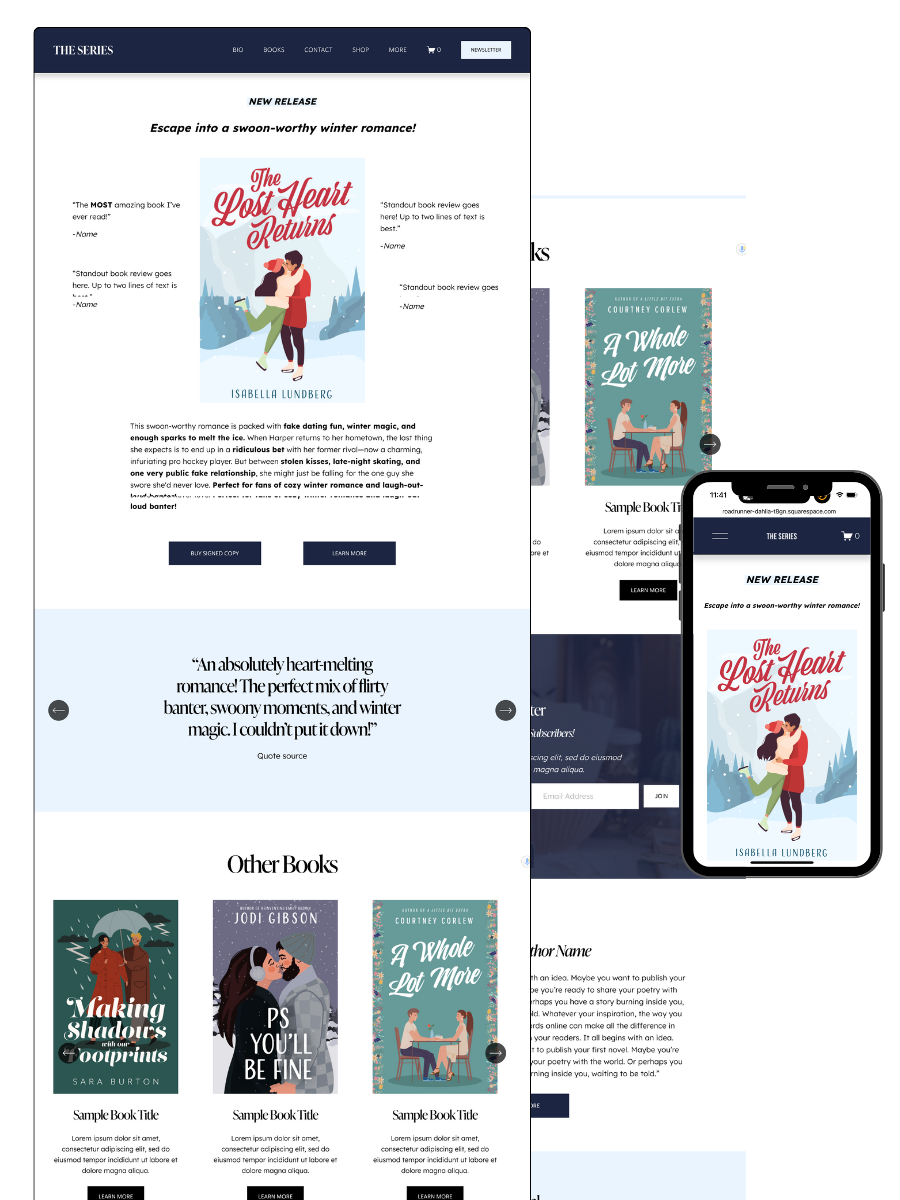The Best Websites for Writers & Authors – Essential Online Resources for Every Stage of Your Writing Journey
Okay, you’ve already got a million things on your mind—plot twists, character arcs, that one villain who won’t cooperate—the last thing you need is to waste hours hunting down the right resources to help you write, publish, or market your book.
The good news? You don’t have to!
Whether you need writing communities for feedback, self-publishing platforms to get your book out into the world, or marketing tools to make sure readers actually find it, this list has you covered.
No more endless searching—just the best websites every writer and author should know about, all in one place!
To get you started, check out all my FREE author resources here!
Best Websites for Writing Inspiration & Idea Generation
Some days, the words flow effortlessly. Other days? You stare at a blank page, willing inspiration to strike. The good news? You don’t have to wait for the muse to show up. These websites are packed with prompts, creative exercises, and expert-led workshops to get your ideas flowing and your stories off the ground.
1. Writing Prompts & Creativity Boosters
Writer’s block? Meet your match. Whether you need a quick writing challenge or a story prompt that sparks an entire novel, these sites deliver fresh ideas to help you break through creative roadblocks.
Reedsy Prompts – Weekly writing challenges with feedback from a thriving writer community.
Squibler– A treasure trove of unique prompts, from quirky one-liners to full-blown story concepts.
The Story Shack – Generates random story ideas, character names, and plot twists at the click of a button.
Sometimes, all it takes is one great prompt to unlock a story you never saw coming.
2. Online Writing Courses & Workshops
If you want to take your writing skills up a notch, learning from the best is a smart move. These platforms offer expert-led courses covering everything from story structure and character development to genre-specific writing techniques and publishing advice.
MasterClass – Learn from bestselling authors like Neil Gaiman, Margaret Atwood, and Dan Brown.
Coursera – Free and paid courses from universities on creative writing, storytelling, and plot development.
Udemy – Affordable, self-paced writing courses on every topic imaginable.
LitReactor – Interactive workshops led by published authors, with real-time feedback from instructors and peers.
Best Writing Communities & Forums
Writing may be a solo journey, but that doesn’t mean you have to do it alone. Whether you’re looking for honest feedback, motivation, or a community that just gets the writer’s struggle, these online spaces are where you’ll find your people.
1. Online Spaces for Writers to Connect & Get Feedback
A good writing community can be the difference between a manuscript collecting dust and a polished book ready for publication. The best forums and critique groups offer constructive feedback, networking opportunities, and a much-needed dose of motivation when imposter syndrome kicks in.
Absolute Write – A massive forum covering everything from writing advice to publishing discussions.
Scribophile – A critique community where you give feedback to earn feedback, ensuring quality engagement.
Critique Circle – A structured feedback exchange for writers serious about improving their craft.
The Writing Cooperative – A Medium-based community offering tips, resources, and writing support.
If you’re feeling stuck, getting feedback from fellow writers who’ve been there can help push your story forward.
2. Social Media Groups for Writers
Social media isn’t just for scrolling—it’s also a goldmine for finding beta readers, accountability partners, and critique swaps. Whether you prefer Facebook, Discord, or Twitter (now X), these platforms have thriving writer communities where you can connect, learn, and grow.
Facebook Groups: “10 Minute Novelists,” “Writers Helping Writers,” and “Beta Readers & Critique Partners” are great places to share work and get support.
Discord Servers: Writing-focused servers like “The Writer’s Block” and “Storyteller’s Tavern” offer live discussions, critique channels, and writing sprints.
Twitter Chats: Hashtags like #AmWriting, #WritersCommunity, and #WritingTips connect you with thousands of writers sharing insights, challenges, and opportunities.
Writing is always better when you have a community cheering you on. Find your people, share your work, and watch your writing thrive.
Best Websites for Self-Publishing & Author Platforms
Gone are the days when traditional publishing was the only path to getting your book out into the world. Self-publishing has opened doors for authors to take full control of their careers, and the right platforms can help you reach readers without gatekeepers standing in your way. But publishing is only half the battle—building your author platform is what turns a one-time book launch into a long-term, successful writing career.
1. Self-Publishing Platforms
If you want your book to reach readers worldwide, choosing the right self-publishing platform is key. Whether you’re launching an ebook, paperback, or hardcover, these platforms make it easy to distribute, sell, and manage your books online.
Amazon Kindle Direct Publishing (KDP) – The go-to platform for self-published authors, offering access to Amazon’s massive marketplace, Kindle Unlimited, and print-on-demand services.
Draft2Digital – A user-friendly alternative to KDP, allowing you to distribute ebooks to multiple retailers (Apple Books, Barnes & Noble, Kobo) with one upload.
IngramSpark – Best for wide distribution, allowing you to print books and get them into libraries, bookstores, and online retailers.
Lulu – A great option for print-on-demand books, workbooks, and special edition releases.
Each platform has its strengths, so choosing the best fit depends on where and how you want to sell your books.
2. Building an Author Platform
Publishing a book is just the first step—building an author platform is what keeps readers coming back for more. Having a dedicated author website makes you look professional, helps you connect with your audience, and gives you full control over your online presence (unlike social media, where algorithms decide who sees your content).
3. Best Website Builders for Authors
Squarespace – A sleek, user-friendly platform with built-in SEO tools, perfect for showcasing books and growing your audience.
WordPress – Highly customizable, great for authors who want more control and advanced blogging capabilities.
Wix – Drag-and-drop simplicity with beautiful templates designed for creatives.
While DIY website builders work for some, a custom author website can take your brand to the next level. A professionally designed site not only makes you stand out but ensures your website is optimized for SEO, book marketing, and reader engagement. If you're serious about growing your audience, investing in a custom-built, high-converting author website is a smart move.
No matter how you publish, your author platform is what turns first-time readers into lifelong fans. The stronger your presence, the easier it is for readers to find, follow, and support your work.
Best Websites for Book Marketing & Promotion
Writing a book is only half the journey—getting it into readers’ hands is the real challenge. With millions of books published each year, standing out requires smart marketing and strategic promotion. The good news? There are powerful book discovery platforms, promotional sites, and SEO strategies that can help you reach the right audience and sell more books.
Book Discovery & Promotional Sites
Whether you’re running a launch campaign or trying to boost ongoing sales, these platforms help connect your book with new readers through targeted promotions, reviews, and email lists.
BookBub – One of the most effective book marketing platforms, offering discounted book promotions to millions of avid readers.
Goodreads – A must for authors, allowing you to list your book, run giveaways, and engage with readers through reviews and recommendations.
StoryGraph – A fast-growing alternative to Goodreads where readers discover new books based on their reading preferences.
Written Word Media – Offers a variety of paid book promotion services that help authors gain visibility across multiple genres.
Getting featured on these sites can drive serious traffic to your book pages and help build a loyal readership.
SEO & Blogging for Authors
Google is one of the most overlooked book marketing tools. A well-optimized blog can help authors rank in search results, attract new readers, and establish credibility in their genre. Instead of relying solely on social media (where posts disappear fast), blog content keeps working for you long-term.
How Blogs Help Authors Get Discovered
Answer reader searches. A post like “Best Historical Fiction Books for Fans of Outlander” can attract your ideal audience.
Drive traffic to your book pages. Every blog post is an opportunity to link to your book, author bio, and newsletter signup.
Boost search rankings. The more useful content you publish, the more likely Google is to send traffic your way.
SEO-Friendly Content Ideas for Author Websites
Behind-the-scenes insights into your writing process
Book recommendations related to your genre
Writing tips and publishing advice
Character deep dives or exclusive bonus content
Personal stories that connect you with readers
A strong SEO strategy paired with smart book promotion makes it easier for readers to discover you—without constantly chasing social media trends. The key is building a long-term presence that keeps working for you, even when you're focused on writing your next book.
Best Websites for Writing Productivity & Tools
Writing takes discipline, focus, and the right tools to help you stay on track, eliminate distractions, and improve your craft. Whether you're working on a novel, editing a manuscript, or looking for freelance gigs, these websites and apps can boost your productivity and make your writing life easier.
1. Writing Software & Distraction-Free Tools
If you find yourself getting lost in endless tabs and notifications, these tools help you focus, organize your work, and refine your writing.
Scrivener – The go-to software for authors, offering powerful organizational features for drafting, structuring, and researching your book.
Hemingway Editor – Highlights complex sentences and passive voice, helping you write with clarity and impact.
Grammarly – A grammar and spell-checking assistant that catches mistakes and enhances readability.
FocusWriter – A minimalist, full-screen writing tool designed to keep you free from distractions.
The right tools can streamline your writing process and help you get words on the page—faster and more efficiently!
2. Freelance Writing & Job Boards
If you're looking to make money with your writing while working on your book, these platforms connect writers with paid opportunities in blogging, content writing, and ghostwriting.
ProBlogger – A top job board for bloggers and content writers looking for freelance gigs.
Upwork – A massive marketplace where writers can find clients in need of articles, ebooks, and web content.
Freelancer – Similar to Upwork, offering freelance jobs across various writing niches.
Contena – A premium platform that curates high-paying writing jobs for professional freelancers.
Freelance writing is a great way to generate income, sharpen your skills, and build your author brand while working on your book.
Final Thoughts – The Best Online Resources for Writers & Authors
Don’t let these tools sit on a list—dive in, explore, and start using them to your advantage! Join a writing community, test out a new productivity tool, or optimize your book marketing strategy.
Every step you take helps build your career as an author.
And if you're serious about establishing your brand and reaching more readers, a professional author website is your most valuable asset. A custom-built site makes you stand out, gives you control over your online presence, and ensures that when readers (or publishers) search for you, they find a site that reflects your work and personality. Ready to take that next step?
Let’s create a website that puts you—and your books—on the map.








